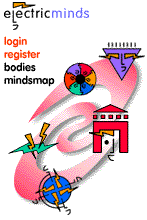|
Though cyberspace is necessarily global, we live and breathe in a local world. No matter how much time we spend online, we belong in some form to the world of town and street, government and discussion and democracy.
Community networks have staked out the territory at the intersection of neighborhood concerns and online power.
There's no hard and fast definition of community network. Broadly, a community network (or civic network, or free-net) is a telecommunications network devoted to bringing a geographical community together. Take the meaning of the word telecommunications broadly, when it comes to community networks: they use the Web, telnet-accessible text-based sites, email, virtual community in the form of conferencing or newgroups. If a particular technology works, if people can use it to get online in some form, community networks employ it.
Generally, community networks are accessible to all of a community's citizens. They can be information repositories, places for community discussion of specific issues, classified sections, computer and Internet education efforts, Internet service providers, coordination centers for civic projects, and listings of local businesses and information. Many have the goal of raising civic awareness and community spirit. Wander through a listing of community networks and see what's out there to appreciate the sprawling territory that community networks have staked out.
This month, Being Here focuses on community networks- what they have accomplished in the past, what they are doing now, and what the future holds. In the Being Here conference, we are discussing issues related to community networking such as:
- Have participants in various community networks found that they serve to revitalize and reconnect a community? Can community networks effectively address the much-noted atomization in our neighborhoods and get neighbors to talk to each other?
- What makes a successful community network? What have pioneers learned over the years?
- What interesting, innovative interesting things are community networks doing? What have you seen out there? Have the efforts of a community network made a difference to life in your community? If a community network doesn't exist where you live, what might one might be able to do for your life and those of people around you?
- How do community networks address the need for public spaces on the Internet, free of advertising, free of fees?
- How do community networks deal with the challenge of sustainability? What keeps community networks vital and alive? Where does the money come from? How do community networks manage to be sustainable, without depending on grants?
- How do communities manage to provide enough access? Does successful community networking depend on a wealthy community, where many people have computer access in their homes?
- What's the measure of a successful community network? What are different places doing right?
If you are new to the community networking world and want to look at what's out there before joining the discussion, check out:
- Organization For Community Networks
- Based in Ohio, the O.F.C.N. provides listings of and information about community networks, functioning as an information clearinghouse.
- National Public Telecomputing Network
- Sadly, the N.P.T.N. has filed for bankruptcy and is shutting down. Nevertheless, its web site is still a rich source of information, particularly about the concept of Free-Nets. N.P.T.N. had been the main leadership organization for the community networking movement; it will be missed by many in the community networking movement.
- Center for Civic Networking
- A civic networking information clearinghouse, based in Cambridge, Massachusetts, C.C.N. is devoted to promoting "the best practices and policies that foster the public use of information infrastructure for community economic development, social service delivery and participation in governance." C.C.N. is cosponsoring the May, 1997 CivicNet '97 conference in San Francisco.
- Twin Cities Free-Net
- Run by David Wooley (who will be a featured guest in our Being Here conversation this month), the Twin Cities Free-Net is both working to address the needs of the Minneapolis-St. Paul region and serving as an information resource for free-nets in general.
- Seattle Community Network
- S.C.N. is the home to the Community Network Movement pages, a wonderful source of information about the community network initiatives. As well, it houses information about the book New Community Networks, published in 1996 by Addison-Wesley Publishing Company. _New Community Networks_ was written by S.C.N. founding member Douglas Schuler, who will also be a featured guest in the Being Here conversation this month.
-
Apple Library of Tomorrow
- Apple Computer's Library of Tomorrow is run by Steve Cisler, who is a leading advocate in the community networking movement. Along with David Wooley and Douglas Schuler, Steve Cisler will be participating in this month's Being Here conversations on community networking.
- The Victoria Telecommunity Network
- This site, the home of the Victoria, British Colombia Telecommunity Network, contains a frequently updated list of free-nets across the world.
- The Morino Institue
- The Morino Institue, led by Mario Morino, is a leading benefactor or the community networking movement, devoted to helping community networks find the best ways to use telecommunications to bring communities together.
These are places to start, but this list is only a beginning. Start exploring the world of community networks on the Web (and beyond) and come join us in Being Here conference with your questions and thoughts.
|


 Being Here
Being Here
